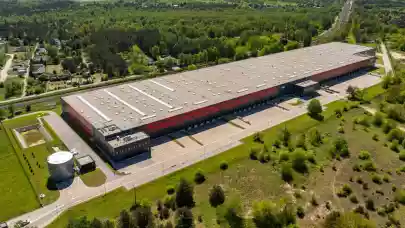
Sylvie Geuten-Carpentier, Managing Partner at Mitiska REIM, talked to Property Forum about the current state of affairs in the Polish investment market, recent activities of Mitiska in CEE countries and the rising attractiveness of the retail park sector.
According to the advisory agency Colliers, in the first three quarters of 2023, investment activity in the CEE countries amounted to €3.2 billion, the lowest in more than 10 years. High interest rates in the eurozone and overseas and difficult access to finance seem to be the most obvious reason for this. But is there something else? Maybe the CEE region has simply lost its appeal in the new post-pandemic reality?
For our investment focus on convenience real estate, spanning retail parks, multi-let light industrial, self-storage and urban logistics, the CEE region has certainly not lost its appeal and continues to present exciting investment opportunities.
While interest rates and access to finance have impacted some investors, this distress and dislocation in the market is in fact creating opportunities for investors with funds raised but not yet invested. The combination of rising operating and financing costs, environmental regulation, tenant demand changes and a reduction in capital availability is creating a unique opportunity for specialist investors like Mitiska REIM.
By keeping dry powder during volatile times, we continue to find outstanding buying opportunities for off-market acquisitions of both properties and portfolios at attractive pricing. With fundraising for our third flagship fund, MEREP 3, standing at €168 million so far, we believe Mitiska REIM is well placed to capitalise on current market conditions.
2023 in Poland has been a very fruitful year for Mitiska REIM - not only did you acquire one of the largest retail facilities in Poland, Gliwice's Europa Centralna, in March, but you are also continuing your cooperation with Karuzela Holding, with whom you plan to build another six retail parks over the next two years. However, all of them will be built in medium-sized and small towns. Could You please explain the choice of locations?
In December last year, we celebrated the five-year anniversary of our strategic joint venture between Mitiska REIM and our Polish partner Karuzela Holding, in which we have built a portfolio of 9 retail parks and convenience centres with a gross leasable area (GLA) of 106,000 sqm. Six more developments are planned to open in 2024/25, creating a total portfolio of 160,000 sqm of modern retail space.
In Poland, we carefully target sites where our assets become the most important and modern convenience retail destinations in the area. We look for properties where there is the opportunity to refurbish or develop retail parks on strategic urban infill locations, along the main traffic arteries of the cities in which they are located. These are always within walking distance of large residential or office areas, making them a ‘go-to’ destination for daily convenience shopping. Typically, cities are targeted which have a population of between 20,000-60,000 inhabitants and are underserved with modern retail space.

Sylvie Geuten-Carpentier
Managing Director Poland
Mitiska REIM
At the end of the year, you sold your portfolio of 25 sites in Romania to M Core. Why such a decision?
The recent sale of 25 retail parks to LCP Group marked the completion of the value-add programs for these assets and does not reflect any intention to leave the Romanian market. Our value-add investment approach is to buy, fix, manage and then sell when assets reach core status so that we can realize the value created for the investors in the funds – the transaction with LCP Group more than doubled the original investment over an average holding period of 5 years for investors in the FRI and FRI 2 funds which owned the assets.
During the sale process, we saw significant interest from a number of potential buyers, which is a testament to investor interest and the depth of liquidity for high-quality retail park assets in Europe.
How do you assess the involvement of Polish developers in the implementation of ESG rules in new projects? How would you assess their environmental awareness compared to, for example, Belgian companies?
Sustainability is now the new currency in real estate. The market’s perspective on sustainability has moved from a ‘nice to have’ to a key requirement, with green credentials now seen as a premium for commercial property.
While this may have happened earlier in Western European markets such as Belgium, it is now also true in Poland and is a trend that will continue to gather momentum, fuelled by the demands of institutional investors, the desire of companies to become greener, and government initiatives to combat climate change. The adoption of metrics such as GRESB performance, BREEAM ratings and CRREM alignment, and the inclusion of solar panels, EV charging stations and LED lighting into designs and refurbishment plans have taken off in recent years as part of a larger Net Zero Carbon roadmap. We at Mitiska REIM have made strong progress in this area.
The real estate market has recognised the importance of ESG and sustainability in driving long-term value for stakeholders and society by ensuring assets are future-proof. We expect this to only grow in prominence in Poland in the coming years.
How do you think the investment market will evolve in 2024 in the CEE region? Will we see a reversal of the downward trend in 2024?
For the past several years we have seen an accelerating opportunity in convenience real estate driven by the converging trends in retail, multi-let light industrial, self-storage and urban logistics, and the increasing demand for urban infill sites that offer accessible locations, affordable buildings and flexible design to a growing range of end-users. We expect this trend to continue in both 2024 and beyond.
Retail parks have enjoyed rising footfall and falling vacancy rates which we believe sets up the sector to continue to outperform. Despite overall challenges to consumer spending, the strong performance in the discount and value retail segment has proved beneficial to retail parks. We believe that food-anchored retail parks will continue to perform well and remain somewhat insulated from the wider macroeconomic environment as consumers continue to spend on essential shopping.
We believe that these ongoing trends will continue to draw investors to convenience real estate and will remain as tailwinds as the wider economic headwinds start to dissipate in the coming year.
Are you planning any new investments in Poland in 2024 and can you already tell us about them?
We are opening two circa 11,500 sqm GLA food-anchored retail park development projects in Świebodzin in April and in Jastrzębie Zdrój in June. And of course, with the launch of MEREP 3, we continue assessing new investment opportunities in convenience real estate (retail parks, light industrial, urban logistics & self-storage) and have a solid pipeline.



